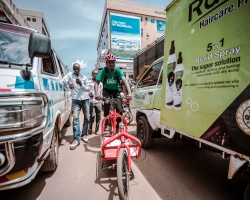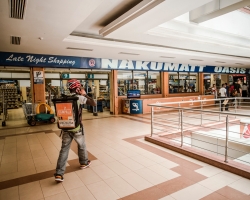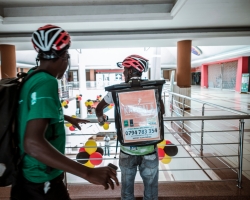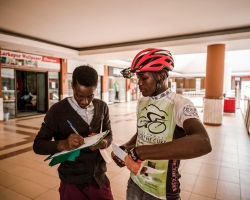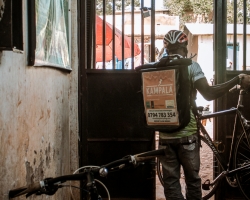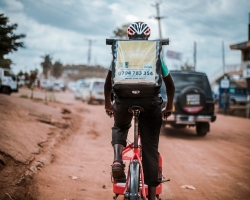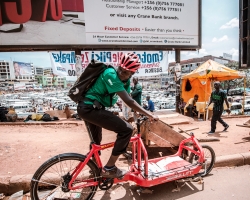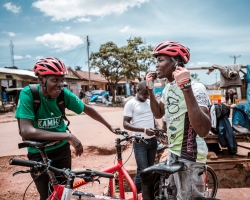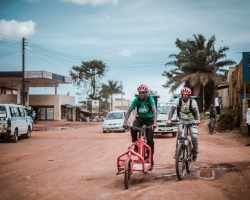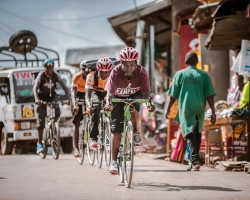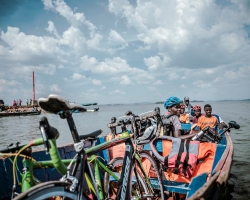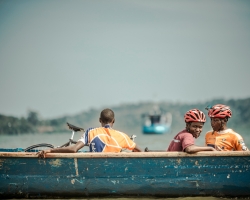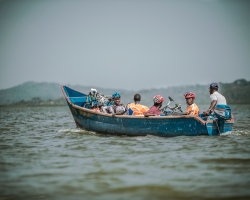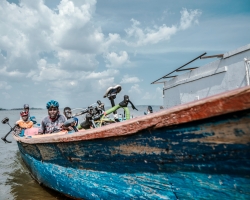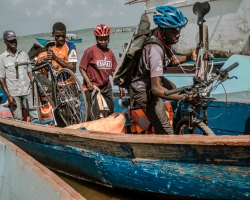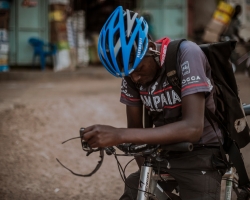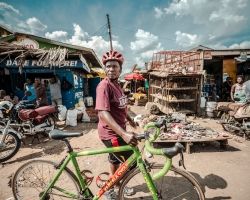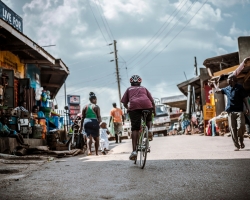They know every pothole personally
Bike couriers in Kampala, Uganda
Text:Tom E. Laengner
The traffic on Entebbe Road in Kampala, Uganda, reflects a poetry that is rough and rhythmic. It’s a far cry from the monotonous pulsating tones of German roads. The red soil of Africa permeates the centre of life in the capital city of this east African country. Here and there it sets warm, red brick toned undercurrents for mini buses, motorbike taxis and pedestrians alike. All these tarred and earthy roads have become home to Richard Kitaka and Henry Nkaluba. They are out and about every day as bike couriers for the Kampala Cycling Club. They love their city, and explain “apart from the good climate, it’s the people who make this city appealing. The people here are usually very tolerant and relaxed.”
Long before the sun reaches its zenith and reveals its full splendor, the working day begins for the couriers. The headquarters of the established Cycling Club lie near the Kasubi Tombs, the ancient royal burial ground of Ugandan kings. Tucked behind parasols, a public well and kiosks, the cyclists are discussing with each other. The topic of the day: the new helmet. It’s light to the touch. It gives a good fit. But will it live up to its looks? After a long and tiring day, the cyclists will be able to answer. In the dim light of the one-story building, dozens of bicycles are stored. Photographs of international cyclists have made themselves at home on the walls, and there are two camp beds in the workshop too. The hub of all the Club’s activities has been here at Masiro Road since 2006. Daily training starts here. Bicycles are rented to tourists here. And it’s from here that the couriers put their feet to the pedals. Before the asphalt has begun to buckle under the sun’s scorching rays, the cyclists are already soaked to the skin as they get checked by security at the embassy building. Both know each other. Both are used to the procedures and the sweat. But this is no issue. The two boys quickly buy themselves a small bag of water on the corner. It resembles a container for ornamental fish; bottles are too expensive for them. Half a litre costs 1000 Ugandan shillings — that’s about 30 euro cents.
Meanwhile, the documents are packed away in their panniers. The helmet straps click shut. A glance at the traffic, and they’re off. The city is too vast to know every corner. “We frequently ask the boda boda drivers”, explains Richard Kitaka, “because as long as they are regulars in the area, they are the most well informed in the district.” Richard Kitaka and Henry Nkaluba associate an unshakeable courage with the drivers of these legendary motorbike taxis. After a few years, they know every pothole personally. Or at least they should be able to. Even if you’d be quite happy letting your goldfish comfortably stay the winter in these inviting craters, there’s no mistaking the danger of these streets. So the helmet does more than just protect a solid hairstyle. It protects the all-important control centre whilst making the cyclists look good. Richard Kitaka and Henry Nkaluba are often on their saddles for up to 10 hours a day, so delivering a package from the embassy to an air-conditioned mall in the city centre is the easy part. In the city of seven hills, it’s all topsy-turvy, but at the same time, there are steep ups and downs. A 10 percent incline is not uncommon, “and at temperatures of over 30 degrees, it’s really hot for us locals, too”, says Richard Kitaka. His t-shirt is drenched and he quickly changes it. Then he turns his attention to his stew, served on a yellow plastic plate. Here in the district of Lubya, the Lieferando delivery service has a different name, but you can find it around the corner. At some point, a boy collects the plate and what’s left of the cassava and beans. This is a type of service that comes across far more environmentally friendly than the mass production of aluminium packaging and plastic bags. The break does Richard Kitaka good. The boys cycle up to 200 kilometres a day, so a break is absolutely essential to regain their energy and keep their concentration fresh. It does the business good as well as the cyclists themselves. There are regulars like the Dutch embassy. They are well pleased with the courier service. They know very well that the bike couriers are not only reliable; they are also faster than if they attempted to struggle through the traffic themselves by car. The 24 year old, with his Bullitt cargo bike, is totally at one with himself, though. “This is what I am. I know I’m different. But I’m doing exactly what I want to do”. Anyone who can say that about themselves knows what it means to be happy.
A rollercoaster ride is nothing compared to cycling through Kampala. Despite all its charm, Amanda Ngabirano describes the rhythm of the city first and foremost as rough and full of risk. The lecturer of Urban and Regional Planning and Development at Makerere University in Kampala knows what she’s talking about. She has been campaigning for an improved infrastructure for cyclists in her hometown since 2011. Her inspiration for this urban pro-cycling culture comes from the Netherlands. She learned how to ride a bike there and became a passionate advocate of an idea that’s fun and does people good. “I want to show that the switch to cycling is possible”, says Amanda Ngabirano, “you can be clever and still wear your favourite dress on a bike. When people say that’s not possible, they can look at me and know better”. Ngabirano knows that this project requires much persistence and courage. Above all, the cyclists in the Kampala Cycling Team ride in a determined, bold and confident way. “I hardly felt the helmet”, says Richard Kitaka, as he reports on his experience of the Tec-Tical Pro, “but the design is exciting to me, too. It just looks great!” Even though they aren’t making much money yet, they of course still want to make a good impression. From time to time, they stand between fruit and vegetable stalls and the mini buses in the city centre, and sometimes look as lost as Jehovah’s Witnesses standing in front of German nightclubs on a Saturday night. “We often end up waiting on customers here at Nakasero Market, and it is indeed frustrating when business gets held up”, comments Richard Kitaka. The here and now is a time of pioneering for these cyclists. They have to be able to put up with a lot, and they accept that. Then, suddenly, they have to pick up the pace again. Henry’s mobile rings. A customer calls and places an order. Speed is quite another story. “A high level of vigilance is far more important”, says Henry Nkaluba. “One wrong move in traffic can cost you your life”. On the way to Nakumatt Oasis Mall on Yusuf Lule Road, the two brush past a Landrover’s wing mirror. Then, a hurried pedestrian doesn’t watch out. It’s a game of centimetres. In the end, these are two scenarios where the couriers could easily have been run over. “That happens to me all the time”, explains Henry Nkaluna, with a wink of the eye, “as long as I don’t get injured, I don’t get worked up anymore”. It remains a game of centimetres. A mixture of passion and defiant bravery. They are nevertheless successful. Marion Ayebale shows this attitude too. The 28 year old childcare worker is the only female cyclist in the club. This doesn’t mean she’s slow by any means. Ayebale is seen as the Marianne Vos of Uganda. The 29 year old Dutch cyclist is a two times Olympic champion and twelve times world champion. “At first, my parents were against me cycling”, says Marion Ayebale, “in Uganda, it’s a cultural thing that women don’t get on bikes”. She did it anyway and has since been training with the team daily. Ayebale sees herself as a role model for other women. Just like her, they should do what they believe to be right.
She has Amanda Ngabirano, the bike enthusiast from Makerere University, on her side. She is campaigning for women to be able to cycle safely in the city. It is good for the environment, for people and for their attitude towards life too. That’s a long way off, though. The infrastructure especially needs attention. Good quality cycle paths are urgently needed. Only then can cycling be safer and more attractive. Ngabirano can’t do this on her own, so she is thankful for the Kampala Cycling Team. She explains, “we need people with perseverance and courage”. Marion, Henry and Richard show that they have what it takes on the streets of Kampala, day in, day out. For this, the Tec-Tical Pro clicks into action daily.
